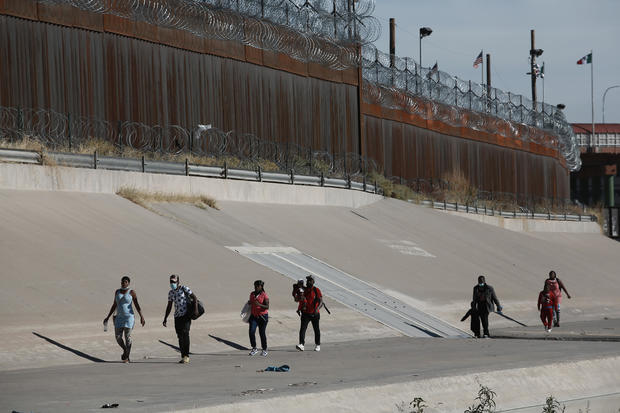To comply with a federal court order, U.S. authorities this week expanded a Trump-era program that requires migrants to await their asylum hearings in Mexico to the busiest border sector for unlawful crossings, the Department of Homeland Security said Friday.
The so-called “Remain in Mexico” policy was expanded to Texas’ Rio Grande Valley, which has historically seen the highest number of migrant arrests along the southern border, on January 19, according to a DHS spokesperson.
Under the latest expansion, migrants enrolled in the program will be processed in Brownsville, Texas, and returned to Matamoros, Tamaulipas, a region in Mexico the U.S. State Department advises Americans not to visit because of cartel violence and the risk of being kidnapped.
The DHS spokesperson said asylum-seekers returned from the Rio Grande Valley to Matamoros will then be “given the option to reside in Monterrey,” a Mexican city further inland, while they await their U.S. immigration court hearings. The State Department is helping the Mexican government offer migrants transportation, COVID-19 testing and shelter, DHS added.
In a statement Friday, the DHS spokesperson noted the Biden administration has sought to roll back the “Remain in Mexico” rules, issuing two termination memos. However, a federal appeals court last month upheld a judge’s ruling that concluded the first termination attempt was unlawful and ordered the Trump-era policy’s revival.
“DHS continues to fight in the courts, including in a pending challenge before the Supreme Court,” the DHS spokesperson said. “In the interim, DHS is committed to abiding by the court-mandated reimplementation of MPP in the most humane way possible.”
Before this week’s expansion, the court-ordered implementation of the “Remain in Mexico” policy, formally known as the Migrant Protection Protocols, had been limited to El Paso and San Diego.
As of Friday, 337 migrants had been returned to Mexico through these cities to await their hearings outside the U.S., according to a spokesperson for the United Nations migration agency, which is transporting asylum-seekers to local shelters.
So far, the Biden administration has been applying the policy to migrants who hail from countries beyond Central America’s Northern Triangle. Over 60% of the asylum-seekers enrolled in the program in December were from Nicaragua, 22% were from Venezuela and 12% were from Cuba, a recent DHS report shows. The rest were from Colombia and Ecuador.
Christian Torres/Anadolu Agency via Getty Images
During the Trump administration, the MPP policy was used to return 70,000 Latin American migrants to Mexico, where many found themselves living in makeshift encampments and crime-ridden cities. Hundreds of migrants reported being kidnapped, extorted or assaulted while waiting in Mexico, according to Human Rights First, a U.S.-based group.
Fewer than 800 migrants enrolled in the “Remain in Mexico” protocols were granted U.S. refuge, while tens of thousands lost their cases or were ordered deported for missing court dates, an analysis of government data shows.
President Biden strongly condemned the policy on the 2020 campaign trail, and he suspended it the day he took office. In June 2021, Homeland Security Secretary Alejandro Mayorkas formally terminated the program.
But Republican officials in Texas and Missouri convinced a federal judge in August 2021 to rule against Mayorkas’ termination and direct the Biden administration to resurrect the protocols.
Mayorkas issued a second termination memo in late October, denouncing the border policy’s “unjustifiable human costs.” But it won’t take effect until the August court order is lifted. In addition to appealing the ruling, the Biden administration also asked the Supreme Court last month to intervene in the case.
The Biden administration made significant changes to its iteration of the “Remain in Mexico” program, which started in early December. Unlike the Trump administration, it required U.S. border officials to ask migrants whether they fear being harmed in Mexico before sending them there.
The administration has also offered vaccination against the coronavirus to prospective enrolles and expanded the categories of asylum-seekers deemed to be too vulnerable to be returned to Mexico, including the elderly, those with medical conditions and members of the LGBT community.
Under current rules, migrants from any country in the Western Hemisphere other than Mexico can be enrolled in the MPP protocols. During the Trump administration, migrants from Spanish-speaking countries and Brazil were eligible to be returned to Mexico.
A DHS report released last week shows that over 90% of the migrants enrolled in the program last month expressed fear of being persecuted or tortured in Mexico. Only 12% passed interviews with U.S. asylum officers.
While the Biden administration has pledged to expand the access asylums-seekers have to attorneys, the DHS report indicates that only 11 asylum-seekers had legal representation during interviews with U.S. officials in December.
In an interview this week, Mayorkas said that while the U.S. asylum system has been broken for years, it “was dismantled in its entirety in the prior administration.” He promised to repair it through a long-awaited rule that aims to speed up the adjudication of humanitarian protection requests by migrants.
“I would respectfully say that we’re building it back better, because this asylum rule is a stark improvement,” Mayorkas told CBS News.

